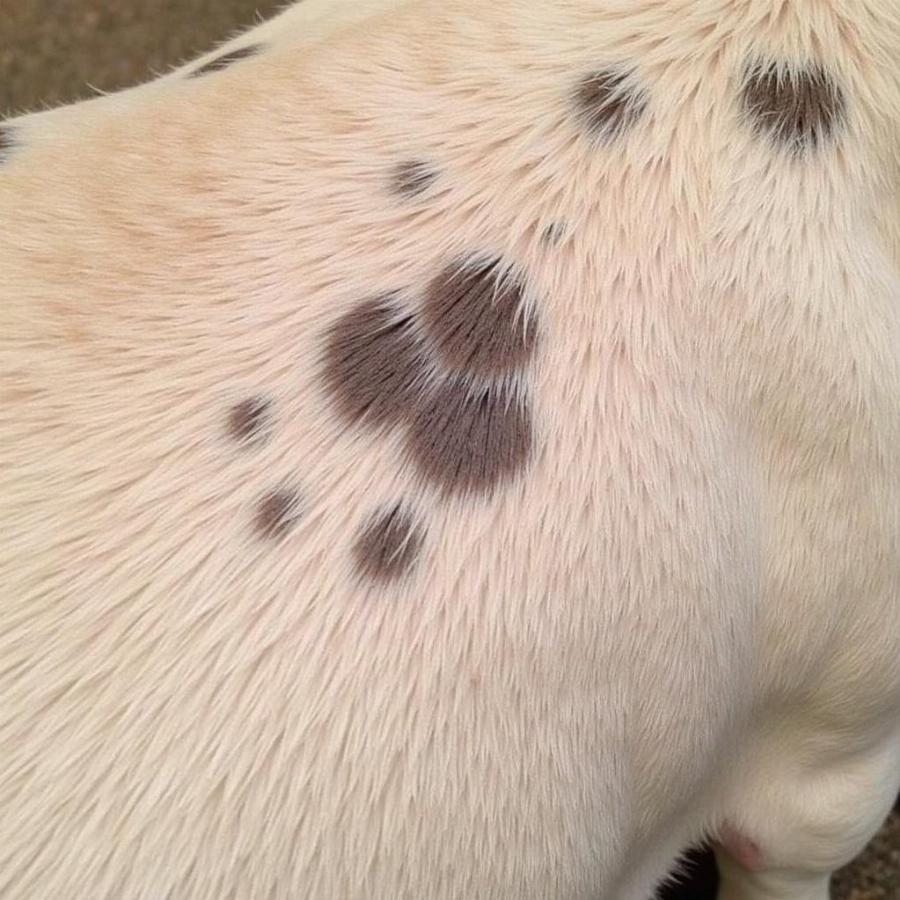Black spots on a dog’s skin can be alarming for any pet owner. Seeing these changes can trigger worries about underlying health issues. Pictures of black spots on dog skin can help owners identify potential problems and seek veterinary advice more effectively. This article aims to provide a comprehensive guide to understanding the various causes of black spots on dog skin, from harmless hyperpigmentation to more serious conditions. We’ll also explore potential treatments and when it’s crucial to consult a veterinarian.
Common Causes of Black Spots on Dog Skin
Black spots can appear on a dog’s skin for a variety of reasons. Some are perfectly normal, while others might indicate an underlying medical condition. It’s essential to understand the differences. Age, breed, and overall health can all play a role in the development of black spots. For instance, older dogs are prone to developing age spots, which are similar to freckles in humans. Certain breeds, like Dalmatians, are naturally spotted. However, sudden changes in skin pigmentation should always be checked by a vet.
 Đốm đen trên da chó
Đốm đen trên da chó
Identifying the Type of Black Spots
Identifying the specific type of black spot is crucial for determining the appropriate course of action. Is it flat or raised? Is the skin around the spot inflamed? Is the dog itching or showing any signs of discomfort? These are all important questions to consider. Accurately describing and showing pictures of black spots on dog skin to your veterinarian will help them make an accurate diagnosis.
Hyperpigmentation in Dogs
Hyperpigmentation is a common cause of black spots on dog skin. It’s essentially an increase in melanin, the pigment that gives skin its color. This can be caused by various factors, including inflammation, sun exposure, hormonal changes, and even certain medications. While usually harmless, hyperpigmentation can sometimes be a symptom of an underlying medical condition.
When to Consult a Veterinarian
While many black spots are benign, some can signal more serious conditions like infections, allergies, or even skin cancer. If you notice any changes in your dog’s skin, such as new spots, changes in the size or color of existing spots, itching, redness, or hair loss around the spot, it’s crucial to seek veterinary advice. black spots on dogs skin pictures can be helpful to show the vet during your appointment.
Black Spots and Skin Infections
Bacterial or fungal infections can also manifest as black spots on a dog’s skin. These infections often cause itching, inflammation, and sometimes a foul odor. black spots on dog skin accompanied by these symptoms should be examined by a veterinarian as soon as possible. Early diagnosis and treatment are key to preventing the infection from spreading and causing further complications.
Treatment Options for Black Spots
Treatment for black spots depends entirely on the underlying cause. For simple hyperpigmentation, no treatment may be necessary. However, if the spots are caused by an infection, your veterinarian will likely prescribe medication, such as antibiotics or antifungals. Allergies might require antihistamines or other allergy medications. In rare cases of skin cancer, surgery or other more intensive treatments might be required. Showing pictures of shar pei dogs, especially if your dog is of that breed, can also be helpful for the vet.
Conclusion
Black spots on dog skin can range from harmless to serious. Careful observation, dog has black spots on skin documentation, and timely veterinary consultation are essential for ensuring your furry friend’s health and well-being. Don’t hesitate to contact your vet if you’re concerned about any changes in your dog’s skin.
FAQ
- Are all black spots on dog skin bad? No, many are simply age spots or hyperpigmentation.
- What should I do if I notice a new black spot on my dog? Monitor it for changes and consult your vet if you have any concerns.
- Can black spots on dog skin be cancerous? Yes, in some cases, they can be a sign of skin cancer.
- How are black spots on dog skin diagnosed? A veterinarian will perform a physical exam and may recommend further tests like skin scrapings or biopsies.
- Can diet affect the development of black spots? A balanced diet is crucial for overall skin health, and deficiencies can sometimes contribute to skin issues.
- Are certain breeds more prone to black spots? Yes, some breeds, like Dachshunds and Schnauzers, are more prone to hyperpigmentation.
- What is the best way to document changes in my dog’s skin? Taking regular pictures is a good way to track changes over time.
Further Reading
You might also be interested in reading about brown spotted dog.
Beaut Dogs: Your Guide to the Canine World
Beaut Dogs is your comprehensive resource for everything related to dog care. We offer expert advice on breed selection, nutrition, training, and overall well-being. When you need help, don’t hesitate to contact us via Email: [email protected]. We’re here to provide accurate and detailed answers to all your dog-related questions.